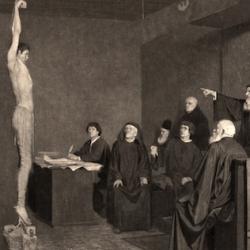In his study of faith-based criminal justice initiatives, More God, Less Crime, Baylor’s Byron Johnson describes the puzzlement of leaders of the prison ministry, Champions for Life, over Johnson’s finding that “born-again prisoners were just as likely to return to prison as other comparable prisoners” (157). They cites 2 Corinthians 5:17, and asked, If someone has become a new creature in Christ, how can they return to a life of crime?
Johnson’s answer is partly to point to the sad facts: They do. But he also offers a theological explanation, and helpfully avoids the easy out of saying that the jailhouse conversions weren’t ever real.
Johnson writes, “If the only difference between inmates who leave prison is that some are born-again Christians, it made sense to me that Christian inmates would have comparable recidivism rates. The conversion experience in and of itself is not enough to protect ex-prisoners from all manner of missteps they might take following release from prison. In-prison programs that provide highly structured instruction and mentoring are important to be sure, but they are only the start. Whatever instruction and mentoring inmates receive behind bars, they need significantly more support as ex-prisoners. Born-again Christian prisoners who are not the beneficiaries of this kind of support will most likely be re-arrested and returned to prison at similar rates as their nonreligious counterparts. Thus, these born-again ex-prisoners – new creations they may be – are just as likely to return to prison, though this time they will bring Jesus with them when they return” (158).
In short, Johnson highlights how critical pastoral care and Christian friendship are to perseverance in faith. Without that care, conversion experiences can be stillborn. We might say, using the terminology in the strictly biblical sense, that prisoners who do not receive pastoral care and continuing fellowship, they have not been incorporated into the new communal life of the age to come. They are “un-regenerate” not because they haven’t had a conversion; they are “un-regenerate” because they stand outside the new world that the New Testament describes as “the regeneration” (Matthew 19).















